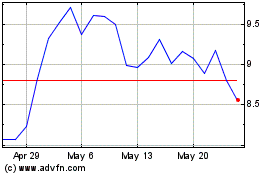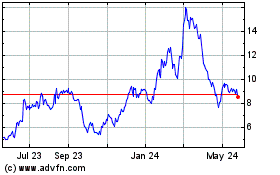ORIC Pharmaceuticals, Inc. (Nasdaq: ORIC), a clinical stage
oncology company focused on developing treatments that address
mechanisms of therapeutic resistance, today announced initial data
from the ongoing ORIC-114 Phase 1 dose escalation trial for
patients with EGFR or HER2 exon 20 mutated non-small cell lung
cancer (NSCLC) at the European Society of Medical Oncology (ESMO)
Congress 2023 (clinical poster here).
“We are excited to present the first look at
ORIC-114 clinical data, which we believe supports the potential to
address the key attributes of a potential best-in-class program for
EGFR/HER2 exon 20 mutated NSCLC: minimal EGFR toxicity, minimal
off-target toxicity, CNS activity, and systemic activity including
post-amivantamab,” said Jacob M. Chacko, MD, chief executive
officer. “Given the high rate of brain metastases in these patients
and the high percentage of patients whose disease progresses in the
brain, we believe that a well-tolerated CNS active agent has the
potential to be transformative.”
“We are pleased with the emerging profile of
ORIC-114 in these heavily pretreated patients, which includes
clinical activity across multiple dose levels and the first
reported intracranial complete response in a patient with EGFR exon
20 lung cancer and documented untreated brain metastases,” said
Pratik Multani, MD, chief medical officer. “This is the first
comprehensive data set for EGFR exon 20 patients with such an
exceptionally high rate of CNS disease at baseline and prior exon
20 inhibitor therapy. Based on the encouraging clinical activity
and favorable safety profile, we plan to advance this program into
dose optimization to select RP2D and, ultimately, into one or more
registrational cohorts for potential accelerated approval.”
ORIC-114 Phase 1 Study
Design
ORIC-114 is being evaluated in a Phase 1 dose
escalation clinical trial in patients with advanced solid tumors
with EGFR and HER2 exon 20 alterations or HER2 amplifications.
Patients previously treated with an exon 20 targeted agent are
eligible, including patients with CNS metastases that are either
treated or untreated but asymptomatic. Nearly all other clinical
studies with EGFR exon 20 inhibitors severely restricted the
eligible patient population and excluded patients with active or
untreated brain metastases and patients previously treated with an
EGFR exon 20 inhibitor, making this data set one of the first and
most comprehensive in this population. The primary objectives are
to determine the recommended Phase 2 dose (RP2D), and additional
objectives include characterization of the safety, tolerability,
pharmacokinetic, and preliminary antitumor activity.
ORIC-114 Phase 1 Dose Escalation
Data
As of September 26, 2023, 50 patients (21 EGFR
exon 20, 24 HER2 exon 20 and 5 HER2+ patients) received ORIC-114
and were heavily pre-treated, with exceptionally high rates of
prior exon 20 targeted therapies and brain metastases at
baseline.
- Of the 21 EGFR exon 20 insertion
mutated NSCLC patients, in addition to chemotherapy
- 81% were treated with ≥1 prior EGFR
exon 20 targeted agent, nearly all of whom received prior
amivantamab;
- 19% were treated with multiple
prior EGFR exon 20 targeted agents; and
- 86% presented with CNS metastases
at baseline
- Of the 24 HER2 exon 20 insertion
mutated NSCLC patients
- 30% were treated with a prior HER2
targeted agent; and
- 38% presented with CNS metastases
at baseline
Preliminary Pharmacokinetic Analysis and
Safety
ORIC-114 demonstrated a favorable
pharmacokinetic profile with dose proportional increase in
exposure, low intra-cohort variability, and a half-life of ~10-15
hours, which supports QD dosing.
ORIC-114 was well-tolerated with mostly Grade 1
and 2 treatment-related adverse events (TRAEs) and little evidence
of off-target toxicities. Rash was limited to Grade 1 and 2 events,
and there was no Grade 3 or greater treatment related rash.
Diarrhea was primarily Grade 1 and 2, with only 6% of patients
experiencing Grade 3 diarrhea. There were only 4% discontinuations
for TRAEs. The maximum tolerated dose has not been reached.
Preliminary Activity Analysis
Systemic and intracranial activity of ORIC-114
was demonstrated in this heavily pre-treated patient population
across multiple dose levels. Preliminary activity data for patients
treated at clinically active doses (total daily dose (TDD) ≥45 mg)
as of the cut-off date were available for 15 response evaluable
NSCLC patients with EGFR exon 20 insertion mutations and 13
response evaluable NSCLC patients with HER2 exon 20 insertion
mutations.
EGFR exon 20 patients:
- Observed systemic and CNS activity
at multiple dose levels, consisting of multiple partial responses
and one ongoing confirmed complete response, including a confirmed
complete response in the brain.
- Within the 45 mg dose level, a
patient had an ongoing confirmed partial response and two of three
brain lesions resolved on therapy.
- Within the 75 mg dose level,
identified as a potential RP2D, of the three patients previously
treated with amivantamab
- All three patients experienced
tumor shrinkage, and
- There was an unconfirmed ORR of 67%
and a confirmed ORR of 33%, including an ongoing systemic confirmed
complete response and the first confirmed CNS complete response
reported by an EGFR exon 20 inhibitor in a patient with documented
untreated brain metastases at baseline.
HER2 exon 20 patients:
- Observed systemic and CNS activity
at multiple dose levels, consisting of multiple partial responses,
including an ongoing confirmed partial response with 100%
regression of all target lesions, with only persistent non-target
lesions preventing a complete response.
- Within the 30 mg BID dose level, a
patient had an ongoing confirmed partial response and shrinkage of
multiple brain lesions on therapy.
Next Steps
The Phase 1 trial of ORIC-114 is ongoing to
determine the candidate recommended RP2Ds for dose optimization,
and subsequently the selection of the final RP2D. Since the
September 26, 2023 data cutoff, the 40 mg BID dose level has
cleared the DLT evaluation period, and the study is now evaluating
50 mg BID and 120 mg QD dose levels. The Phase 1 trial will enroll
patients with EGFR exon 20 insertion mutations that are EGFR exon
20 inhibitor-naïve, and additional patients who are
post-amivantamab. Additionally, enrollment will be expanded to
include patients with atypical EGFR mutations based on the
promising preclinical activity presented at ESMO 2023 (preclinical
poster here).
Conference Call and Webcast Details
To join the conference call via phone and
participate in the live Q&A session, please pre-register online
here to receive a telephone number and unique passcode required to
enter the call. A live webcast and audio archive of the conference
call will be available through the investor section of the
company’s website at www.oricpharma.com. The webcast will be
available for replay for 90 days following the presentation.
About ORIC-114
ORIC-114 is a highly selective, brain penetrant,
orally bioavailable, irreversible inhibitor designed to selectively
target EGFR and HER2 with high potency against exon 20 insertion
mutations, making it a promising therapeutic candidate to address
the unmet medical need of having both meaningful systemic as well
as CNS antitumor activity.
About ORIC Pharmaceuticals,
Inc.
ORIC Pharmaceuticals is a clinical stage
biopharmaceutical company dedicated to improving patients’ lives
by Overcoming Resistance In Cancer. ORIC’s
clinical stage product candidates include (1) ORIC-114, a brain
penetrant inhibitor designed to selectively target EGFR and HER2
with high potency against exon 20 insertion mutations, being
developed across multiple genetically defined cancers, (2)
ORIC-533, an orally bioavailable small molecule inhibitor of CD73,
a key node in the adenosine pathway believed to play a central role
in resistance to chemotherapy- and immunotherapy-based treatment
regimens, being developed for multiple myeloma, and (3) ORIC-944,
an allosteric inhibitor of the polycomb repressive complex 2 (PRC2)
via the EED subunit, being developed for prostate cancer. Beyond
these three product candidates, ORIC is also developing multiple
precision medicines targeting other hallmark cancer resistance
mechanisms. ORIC has offices in South San Francisco and San Diego,
California. For more information, please go
to www.oricpharma.com, and follow us on X
or LinkedIn.
Cautionary Note Regarding
Forward-Looking StatementsThis press release contains
forward-looking statements as that term is defined in Section 27A
of the Securities Act of 1933 and Section 21E of the Securities
Exchange Act of 1934. Statements in this press release that are not
purely historical are forward-looking statements. Such
forward-looking statements include, among other things, statements
regarding the continued clinical development of ORIC-114; ORIC-114
clinical outcomes, which may materially change as patient
enrollment continues or more patient data become available;
ORIC-114’s development plans and timelines; the potential
advantages of ORIC-114; plans underlying ORIC’s clinical trials and
development; and statements by the company’s chief executive
officer and chief medical officer. Words such as “believes,”
“anticipates,” “plans,” “expects,” “intends,” “will,” “goal,”
“potential” and similar expressions are intended to identify
forward-looking statements. The forward-looking statements
contained herein are based upon ORIC’s current expectations and
involve assumptions that may never materialize or may prove to be
incorrect. Actual results could differ materially from those
projected in any forward-looking statements due to numerous risks
and uncertainties, including but not limited to: risks associated
with the process of discovering, developing and commercializing
drugs that are safe and effective for use as human therapeutics and
operating as an early clinical stage company; ORIC’s ability to
develop, initiate or complete preclinical studies and clinical
trials for, obtain approvals for and commercialize any of its
product candidates; changes in ORIC’s plans to develop and
commercialize its product candidates; the potential for clinical
trials of ORIC-114 to differ from preclinical, initial, interim,
preliminary or expected results; negative impacts of health
emergencies, economic instability or international conflicts on
ORIC’s operations, including clinical trials; the risk of the
occurrence of any event, change or other circumstance that could
give rise to the termination of ORIC’s license and collaboration
agreements; the potential market for our product candidates, and
the progress and success of competing therapeutics currently
available or in development; ORIC’s ability to raise any additional
funding it will need to continue to pursue its business and product
development plans; regulatory developments in the United States and
foreign countries; ORIC’s reliance on third parties, including
contract manufacturers and contract research organizations; ORIC’s
ability to obtain and maintain intellectual property protection for
its product candidates; the loss of key scientific or management
personnel; competition in the industry in which ORIC operates;
general economic and market conditions; and other risks.
Information regarding the foregoing and additional risks may be
found in the section entitled “Risk Factors” in ORIC’s Quarterly
Report on Form 10-Q filed with the Securities and Exchange
Commission (the “SEC”) on August 10, 2023, and ORIC’s future
reports to be filed with the SEC. These forward-looking statements
are made as of the date of this press release, and ORIC assumes no
obligation to update the forward-looking statements, or to update
the reasons why actual results could differ from those projected in
the forward-looking statements, except as required by law.
Contact:Dominic Piscitelli,
Chief Financial Officerdominic.piscitelli@oricpharma.com
info@oricpharma.com
Oric Pharmaceuticals (NASDAQ:ORIC)
Historical Stock Chart
From Nov 2024 to Dec 2024

Oric Pharmaceuticals (NASDAQ:ORIC)
Historical Stock Chart
From Dec 2023 to Dec 2024
